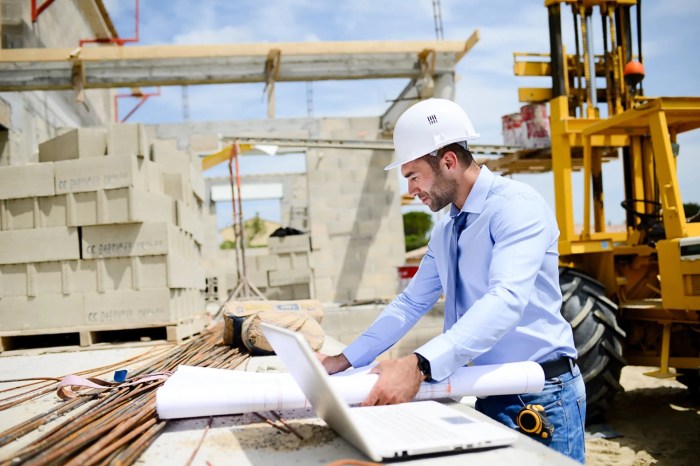Exploring Local Commercial Contractors for Your Next Project
Diving into the world of local commercial contractors, this introduction sets the stage for a fascinating journey. From the crucial role they play in commercial projects to the benefits of hiring them, this overview will provide valuable insights for anyone considering their services.
As we delve deeper, we'll uncover the array of services offered, factors to consider when hiring, trends shaping the industry, and even showcase successful projects that highlight the expertise of local contractors.
Overview of Local Commercial Contractors

Local commercial contractors play a crucial role in managing and executing various construction projects for businesses and organizations in a specific area. These contractors specialize in commercial construction, which includes projects like office buildings, retail stores, restaurants, and industrial facilities.Hiring local commercial contractors offers several benefits for commercial projects.
Firstly, local contractors have a better understanding of the local building codes, regulations, and climate conditions, which ensures compliance and efficiency in project execution. Additionally, working with local contractors fosters better communication and collaboration, leading to smoother project management and timely completion.Commercial projects that require the expertise of local contractors include the construction of new office complexes, renovation of retail spaces, expansion of industrial facilities, and the development of healthcare facilities.
These projects demand specialized knowledge and experience in commercial construction, which local contractors are well-equipped to provide.
Examples of Commercial Projects
- Construction of a new corporate headquarters for a local business
- Renovation of a shopping mall to accommodate new stores and amenities
- Expansion of a manufacturing facility to increase production capacity
- Development of a medical office building to serve the healthcare needs of the community
Services Offered by Local Commercial Contractors

When it comes to commercial construction projects, local commercial contractors offer a wide range of services to meet the needs of businesses. These services can vary depending on the size and scope of the project, but some common services provided by local commercial contractors include:
1. Design and Planning
Local commercial contractors often assist in the design and planning phase of a commercial project. They work closely with architects and engineers to create plans that meet the client's needs while adhering to building codes and regulations.
2. Construction and Renovation
From ground-up construction to renovations and expansions, local commercial contractors handle all aspects of the construction process. This includes site preparation, building the structure, and finishing details such as flooring, painting, and interior design.
3. Project Management
Local commercial contractors oversee the entire construction project, managing subcontractors, scheduling, and budgeting to ensure the project is completed on time and within budget. They act as the main point of contact for the client throughout the construction process.
4. Permitting and Licensing
Local commercial contractors assist in obtaining the necessary permits and licenses for the construction project. They ensure that all work is done in compliance with local building codes and regulations, avoiding any potential legal issues down the line.
Choosing the Right Contractor
Selecting the right contractor for a commercial project is crucial to its success. When choosing a local commercial contractor, consider the following factors:
1. Experience and Expertise
Look for contractors with experience in commercial construction projects similar to yours. Check their portfolio and ask for references to ensure they have the expertise to handle your project effectively.
2. Reputation and Reviews
Research the contractor's reputation in the industry and read reviews from previous clients. A good reputation and positive reviews are indicators of a reliable and trustworthy contractor.
3. Licensing and Certifications
Verify that the contractor holds the necessary licenses and certifications required to work on commercial projects in your area. This ensures that they meet the standards set by regulatory bodies and have the qualifications to perform the work.
4. Communication and Transparency
Choose a contractor who communicates effectively and is transparent about the project timeline, budget, and any potential challenges. Clear communication is key to a successful construction project.
5. Cost and Budget
Get detailed cost estimates from multiple contractors and compare them to find the best value for your budget. Avoid choosing a contractor solely based on price, as quality and expertise are equally important factors to consider.
6. Contract and Agreements
Before hiring a local commercial contractor, make sure to review and sign a detailed contract that Artikels the scope of work, timeline, payment schedule, and any other important terms and conditions
Factors to Consider When Hiring Local Commercial Contractors

When hiring local commercial contractors, there are several key factors to consider to ensure a successful partnership. From cost implications to negotiation strategies, making informed decisions is crucial.
Key Factors to Consider
- Experience and Expertise: Look for contractors with a proven track record in commercial projects similar to yours.
- Reputation: Check reviews and ask for references to gauge the contractor's reliability and quality of work.
- Licenses and Insurance: Ensure the contractor is properly licensed and carries adequate insurance to protect both parties.
- Communication and Accessibility: Clear communication and easy accessibility are essential for a smooth working relationship.
Cost Implications of Hiring Local vs. Non-Local Contractors
While local contractors may have a higher initial cost compared to non-local options, there are cost-saving benefits to consider:
- Reduced Travel Expenses: Local contractors do not have to factor in travel costs, potentially saving money in the long run.
- Knowledge of Local Regulations: Local contractors are familiar with local building codes and regulations, reducing the risk of costly mistakes.
- Quicker Response Time: Local contractors can respond faster to emergencies or unexpected issues, minimizing downtime.
Tips for Negotiating Contracts
- Clearly Define Scope of Work: Ensure all project details, timelines, and expectations are clearly Artikeld in the contract.
- Agree on Payment Terms: Establish a payment schedule that works for both parties and includes milestones for project completion.
- Include Warranty and Guarantee: Make sure the contract includes warranties for workmanship and materials to protect your investment.
- Discuss Change Orders: Artikel the process for handling changes to the project scope and associated costs.
Trends and Innovations in the Local Commercial Construction Industry
In recent years, the local commercial construction industry has seen significant trends and innovations that are shaping the way projects are planned and executed. These changes are driven by advancements in technology, a growing focus on sustainability, and a desire for more efficient and cost-effective construction practices.
Emerging Trends in the Local Commercial Construction Sector
The local commercial construction sector is witnessing a shift towards more modular and prefabricated construction methods. This trend allows for faster project completion, reduced labor costs, and improved quality control. Additionally, there is a growing emphasis on incorporating smart technology into commercial buildings, such as energy-efficient systems and IoT (Internet of Things) devices for improved building management.
Impact of Technology on Local Commercial Contractors
Technology is revolutionizing the way local commercial contractors operate. Tools like Building Information Modeling (BIM) software enable contractors to create detailed 3D models of projects, improving collaboration and reducing errors during the construction process. Drones are also being used for site surveys and inspections, increasing efficiency and safety on construction sites.
Sustainable Practices Adopted by Local Commercial Contractors
Local commercial contractors are increasingly adopting sustainable practices in their construction projects. This includes using environmentally friendly materials, implementing energy-efficient designs, and incorporating renewable energy sources like solar panels. By prioritizing sustainability, contractors are not only reducing the environmental impact of their projects but also meeting the growing demand for green buildings in the market.
Case Studies of Successful Projects Completed by Local Commercial Contractors
In this section, we will highlight some notable commercial projects that have been successfully completed by local commercial contractors. These case studies will showcase the quality of workmanship and attention to detail exhibited by these professionals.
The Plaza Mall Renovation
The Plaza Mall renovation project, undertaken by XYZ Construction, involved a complete overhaul of the existing mall structure to modernize and attract new tenants. One of the main challenges faced by the contractors was working within a tight timeline to minimize disruption to the mall's operations.
To overcome this, the contractors implemented a phased approach, ensuring that different sections of the mall were renovated sequentially to allow for continued business operations. The project was completed on time and within budget, showcasing the efficiency and project management skills of the local commercial contractors.
Office Building Expansion for Tech Company
Another successful project completed by ABC Builders was the expansion of an office building for a leading tech company. The challenge in this project was to seamlessly integrate the new construction with the existing building while ensuring minimal disruption to the company's daily operations.
The contractors utilized advanced building technologies and materials to expedite the construction process without compromising on quality. The end result was a sleek and modern office space that met the client's requirements and exceeded expectations.
Restaurant Chain Interior Design and Renovation
For the interior design and renovation of a popular restaurant chain, LMN Contractors were tasked with creating a cohesive and inviting space for customers. The challenge here was to maintain the brand identity of the restaurant chain while infusing new elements to attract a wider audience.
The contractors worked closely with the client to understand their vision and executed the renovation with precision and creativity. The revamped restaurants now boast a fresh and modern look, attracting more customers and increasing revenue for the chain.
Conclusive Thoughts
In conclusion, the realm of local commercial contractors is vast and dynamic, offering a blend of traditional expertise and modern innovations. Whether you're embarking on a new project or looking to revamp an existing one, local contractors can be the key to success.
FAQ Guide
What qualifications should I look for when hiring a local commercial contractor?
Look for contractors with relevant experience, proper licensing, insurance, and a solid reputation in the industry.
How can I ensure the quality of work from a local commercial contractor?
You can ask for references, view past projects, and discuss your expectations clearly before hiring.
Are local commercial contractors more cost-effective than non-local ones?
In some cases, local contractors may offer better pricing due to reduced travel costs and familiarity with local suppliers.
What are some common services provided by local commercial contractors?
Services may include construction management, remodeling, tenant improvements, and general contracting for commercial projects.




